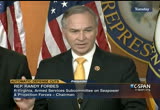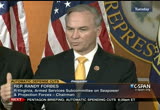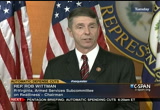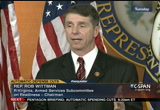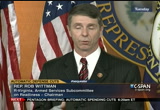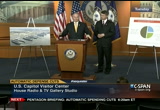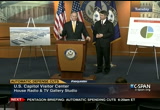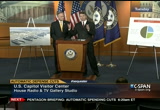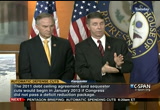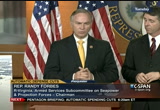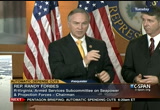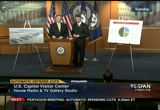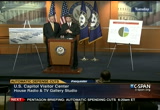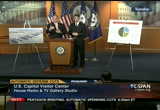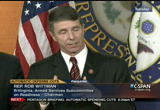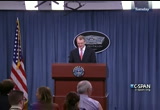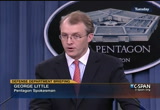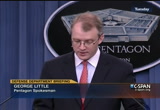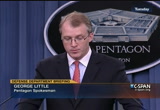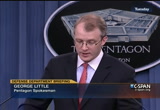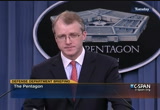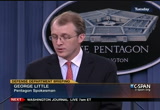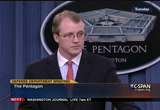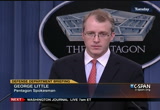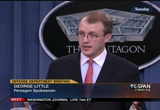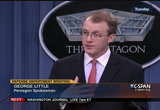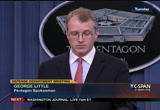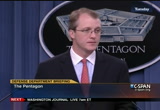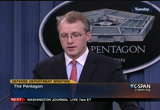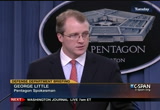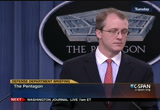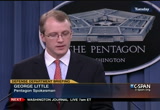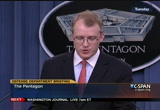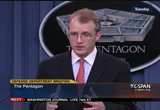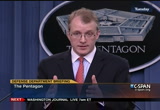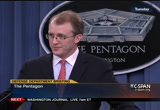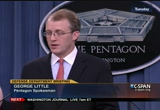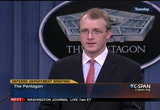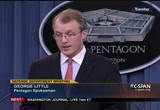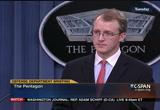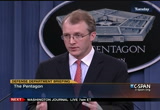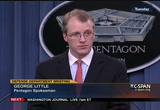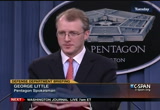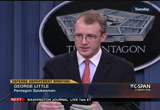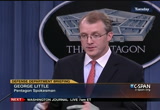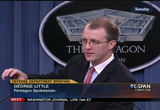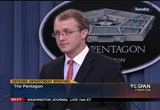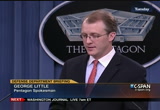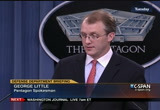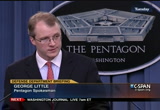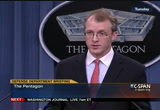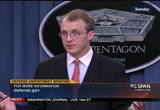tv Capitol Hill Hearings CSPAN February 27, 2013 6:00am-7:00am EST
6:00 am
was a compromise that was proposed by the president, and even though i voted against it, we are looking at it today. the last thing i want to point out to you is this -- many people ask why this is difficult to get a compromise in washington. three points from the president because he was -- he is our commander in chief. the first is it is very difficult to reach compromises when you consistently move the goalposts here it as you know, the bca, that was supposed to be a compromise. i have a list of quotes from the president and others in the white house talking about the fact that it was a compromise. no sooner than it got past, all of a sudden you started moving the goalposts and trying to get more revenue. second, a month or so ago we had a big debate. the crisis time coming out whether we would increase tax rates.
6:01 am
the goalposts were moveon appeared the second thing is, the president has a difficult time talking to people who do not agree with him. so if you will see inset of the president bringing individuals in congress who might disagree with him and sit down and talk to them to see if they can resolve those differences, the president has surrounded himself with campaign stops where he puts people who already agree with him around a chair and clap at everything he says. if you want to reach a compromise, the best way to do that is to go in a room with people who might disagree with you and try to listen for a moment. third, the best way to get a compromise is not to think that everybody who disagrees with you is some type of villain. that is the way the president seems to put it when he attacks every republican, almost 50% of the electorate across the country, just because they agree with him -- disagree with them.
6:02 am
i hope the president will come back to washington come a sit down with us and hopefully we can get some sort of compromise that would stop sequestration from taking place. with that, i would like to turn it over to chairman wittman who will talk to about the dangers of sequestration. >> thanks. thanks for your eloquent laying out of the issue that is before us. just as you see here, a couple of weeks ago, we asked the chief of naval operations and the common aunt of marine corps, if this was the picture of things to come. five aircraft carriers and ports, our large portion of the naval presence there, not a c. sailors at the docs. if that was the scope of things to come. their answer to us was yes. if the sequestration went into
6:03 am
effect, aircraft carriers not being deployed, new ones not being built, current ones not being refueled. that is significant. that cuts right to the issue of readiness. we heard from all of the service agencies the issue of readiness. termedrned that as a -- it as a readiness crisis. they need to assure that we can be victorious in whatever situation that we face. that is deeply concerning. i appreciate the president traveling today, being right across the river from the naval base, so he understands the greatest ships in the world are built there by the greatest shipbuilders. the commitment it takes from them, how important the industrial basis to this nation,
6:04 am
how important our civilian employees are to the dod and the contracting immunity -- community -- all of the individuals are part of the sequestration. and the president seeks about compromise, putting ideas on the table. i cannot agree more. let's find common ground, find ways to do that. i have to agree with the president's idea of a balanced approach. we have had 600 billion dollars in tax increases that passed in january without any reductions in spending. now is the time to have the reductions in spending. the balance needs to be there. the balance is not there at this point. that's why we urged the president to be a part of the discussion, how do we become a part of the reduction. 2.4% is doable. we have a budget of $3.6 trillion. if we cannot achieve that, which decreases the rate of increase, it is not even get us below where we are from years past two today, we ought to be
6:05 am
able to do that. i believe that we can do that. if we can do that in a way that is thoughtful and not just disruptive to our military, in a way that is not tie the leader of our military's hands, allows them to put forward their priorities to make sure that they are doing what is necessary for all of the service branches to do the job that they are charged with doing. again, i go back to the issue of readiness. all of them have said this will severely impact readiness. their ability to meet those threats around the world. to me, that is indicative of what we have before us and that is to make sure that the reductions across the budget are done in a mindful way. we talk about a balanced approach. the balance ought to be in looking in other areas of the budget. in 2011, 400 $87 billion in reduction were placed in defense. now is the time to look at other areas of the budget as far as achieving those savings to reduce the budget. once we both -- once we go
6:06 am
through that, we can come back and talk about where we can be efficient in defense. but we have to have a balanced approach, which means we have to talk about spending and spending in the nondefense areas since we have already reduced spending on the defense side and we have already addressed the revenue side of the equation and having those increase revenues. i really see those as the path for discussion. balance -- that is the balanced approach, to talk about those spending areas and ways that we can look at offsetting the reductions imposed on the defense budget side, and especially looking at not only where we can reduce the budgets in other places through savings and efficiencies, but also looking at the current situation with spending within the pentagon and making sure that our leaders there have the ability to make sure that they meet this nation's priority in
6:07 am
making those spending decision. i appreciate the opportunity to coming -- to come before you. we look forward to taking your questions. >> can you clarify, does it completely remove defense? >> it would. sequestration has two primary components that we dislike. one is the severity of the cuts in national defense and the second is the arbitrary way in which it doesn't. what we are basically saying is we ought to at least agree on the national security defense and we do not want to do anything that would jeopardize that. this bill is in a simplistic form that everyone can expand -- can understand, that sequestration would not be good for national defense. adjusting the numbers anywhere they wanted to, but it would basically say that we are not going to use this kind of
6:08 am
arbitrary approach when it comes to national defense. >> we tend to be hearing two messages from republicans. one is that this is dangerous, but say we had comments from senators who say that a 1% or 2 % reduction in spending is not that bad. is it really bad? >> when you look across the building we're in, you always hear muddled messages. some of my democratic friends want to do away with huge segments of the defense budget completely. not all of them. some of them have one of the cuts that have taken place. some of them have ought against those cuts. if you look on the republican side, we will have some people that will talk in terms of overall cuts and some look in narrow defense. if i took the two items you
6:09 am
just raise, one would be overall spending across the budget. we are not asking the president to stop spinning. we are just asking him to moderate some of his spending. as chairman women pointed out, we had 2.4% cuts in the size of our budget. if that will bring the nation to its knees, that is something we ought to be concerned about. but is a whole different picture when we talk about defense because, as rob pointed out, every single cut this it ministration has had so far has been defense. find any other cuts that they have made anywhere else. they made none. we are looking at a situation, this was not just $487 billion, that was is a biphasic out of the apple. fayard he had a half trillion dollars of spinning cuts already. they took defense cuts on top of that. i can tell you, and i think rob would agree from the readiness subcommittee, our national defense cannot withstand that. and still continue to have the
6:10 am
kind of national defense we want to protect this country. >> as randy pointed out, there has already been a significant matter of reductions on the table, over half $1 trillion. if you then look at what the sequester puts in place, it is also this report should it. now we are saying 50% of the cuts will take place in 20% of the budget. it is the disproportionality of what we are facing with cuts to our national defense that create that imbalance. the overall reduction of the budget, which to the point is to say, if you spread those cuts out and defense has taken its fair share of those cuts, if you spread those out in other areas of the budget, put it in perspective about what we really need to do to get this in hand. i think that is what we have to remember from this is this reportedly, the defense would have been affected already in the last two years. this proposes to do even more
6:11 am
there to create the strategic imbalance. >> yesterday at the white house , someone suggested that if the sequester were to go ahead, that the united states would become demised in its ability to protect against terrorism. you spelled out your economic concerns. talk about military readiness from that perspective. where do you think this puts us after friday, militarily in our ability to do what we need to do? >> it does affect our readiness. it affects our readiness because our military chance to not have the -- chiefs do not have the ability to place cuts methodically across the board. the things that are important to them, they do not get the ability to make a priority decision about where the funding needs to be placed or where the reductions need to be placed.
6:12 am
it ties their hands. regardless of the importance of what you do, you have got to cut everything. that does not make sense. that is the logical part of this. the indiscriminate nature of these cuts. if they at least had the ability to say, based on my best judgment, here are places i could reduce the budget that would not have as much impact, this would make this less constipated. it still exacerbates the issue as we talk about because this is another cut in a series of cuts that continue to cut at the ability for our military to do the job it needs to do. >> one of the things we will see is more people asking the question you just raise, but not just for sequestration. i want to put this in context. we will mitigate a lot of horror stories you hear. what they see, anomaly spirit we can do a lot of that. we will still have huge problems with national defense in terms of readiness and in terms of where we want to be. but it is not just sequestration. these cuts have artie taken place. as you know, the ministration
6:13 am
moved -- the administration moved the defense systems from europe and put them on the back of the navy without additional resources. one of because we will see is the inability to do upgrades. we will have a right there. in terms of ships, part of that is increasing the deployment time to seven months from six. that is a deep thing on the backs of our men and women and uniform. that is without sequestration. by 2020, we will be outmanned in terms of summaries in the pacific 78-32 by the chinese. none of those are good pictures. what we are hoping is in addition to sequence ration, we will be looking at this in context that these cuts have already been taking -- taken. what can we afford to cut? what is the risk to you the united states of america by not supplying these questio? >> we've heard so much about who
6:14 am
is to blame, but members of the super committee are long gone. they failed to reach an agreement. don't they share the blame, and why are we not hearing about them? >> i think we need to know where we come from to know where we are going. that is a fair question. you can put blame where you want. i can put it on the president for having propose it. i think that does a lot of good. i can put the blame on congress for not reaching an agreement. i can say all day long, i did not vote for it, so don't blame me. but that is not helpless. . one of the things i do think you've got is you know and we started out with a bad compromise will be worse than no compromise. the inability for us to come in a room and listen to people who disagree with us and try to find common ground, and the
6:15 am
common ground we ought to be able to find today is the national defense of this country. that is what rob and i are working on. i am not asking anybody to compromise their principles. i'm just saying, can we sit in a room and talk instead of going out with press covers it and beating each other. we are not beating anybody. we are saying this is something we need to do for the american people, sit in a room, see if we can find common ground. that is why this bill we put in, and even though where we are in time and at least says >> it seems as though they have been lost in this process. we have heard positive things from them even though they have failed to reach an accord. >> i did not think the supercommittee was a good idea. i cannot defend them. >> the path that we have been
6:16 am
over as inconsequential. at the time, it would have been. congressman forbes and myself are vocal about the supercommittee needing to get their job done. that time has expired. we have said congress should be an ssn -- and session through august. we are here to a series of events. folks say, we do not care who is at fault. we are looking at getting things done. folks are in christ six that he. -- crisis fatuigiuigue. this is where we are. we have the obligation to this nation, to our dod civilian
6:17 am
employees in the contractor workforce in this nation's national defense to get this done. this is one of those things at the top of the list. when you raise her hand and swear to uphold the constitution, one of the top things to do is our job. that is what people expect us to do. they expect us to make the tough decisions. here we are at the 11th hour needing to do. that is why we are here. there are opportunities for us to get that done. >> we will not rely on the supercommittee. this comebacks to your question. when march 1 comes, we will not rest. we will work and make sure we are litigating these consequences.
6:18 am
[inaudible]what is the nature of that discussion question is that something that is being considered? if so, who is involved? >> we have been involved in those conversations with the leadership at the committee level of appropriations and with the conference leadership about how we would go about doing that. there is concerned about giving transfer authority. we have been part of a discussion to say let us identify the priorities to determine where the money is needed to address the most severe and timely means. let us put together a cr that allows that. >> when sequestration came up,
6:19 am
you had to go out your dictionaries. pulled him out for the word anomaly. next week that is what you will look at as we start working at cr's to allocate the budget items into the lines the service chiefs need so they do not have to do the horror stories we are hearing today. we will mitigate a lot. >> thank you. >> on the next washington -- are, l august are bermand and phili roe. then a discussion on sequestration. later, keith lang of the hill newspaper on warnings on how the automatic cuts will affect the
6:20 am
travel industry. after that, the automatic spending cuts and the agricultural department. washington journal is live a.m.ing at seven7:00 the military has made no plans to reconsider its defense strategy as budget cuts approach. mr. little said the cuts known as the sequester would result in a nine percent overall cuts in the military budget. this is defined minutes. -- this is 35 minutes. >> good afternoon. sciquest is set to begin friday
6:21 am
unless congress acts. there is a belief in some quarters that when it comes to negative impact the sequester will have, the department of defense is crying wolf. nothing is further from the truth. we have heard from leaders. it is not hype. it is the truth. it is not exaggeration. it is a clear assessment of what would happen to the department if we are forced to put this in place. under secretary panetta, the departments leaders have been forthright in describing how the military would operate in a post sequester world. there remains confusion over how sequester would function and whether there are steps that may mitigate the harm. but we try to was dressed this. the sequestration goes into effect for the remainder of the
6:22 am
year. it requires the department of defense to cut torry $6 billion $46 billion.llio it would apply to all of the dod budget. the exception is that the president will exempt all military personnel funding from sequestration. dod leaders support this. it does not mean other budget accounts will be cut by larger amounts. in addition to requiring these large cuts, the law mandates that they be applied in a rigid across the board manner. cuts to the operating portions of the dod budget and must be equal at the level of appropriations accounts. for example, army maintenance, navy reserve maintenance, and
6:23 am
air force guard operation maintenance. for the investment portion, the dollars cut must be allocated at a line item level of detail. more than 2500 programs would need to be reduced by the same percentage. managers will decide how best to allocate the reductions will department leaders would be deprived of the taxability of protecting some investment programs. we are operating under a continued resolution that is adding to the fiscal difficulties in this year. the cr provides the right for the dod.l on funding it is not enough maintenance accounts to sustain daily
6:24 am
operations. it is in balance is not corrected and sequester hits, there will be a huge shortfall in operations and maintenance accounts. across dod, we will be short 20% and the percentage will be u.s.s army.r the the army will have to cut training. the same is true for the air force. the navy and marine corps will readiness.asgh the prospect of these cuts let the chairman, vice chairman, and joint chiefs to sign a 28 * onetter saying we are
6:25 am
the brink of creating a hollow force. the department leaders are working to avoid the worst effects of this situation. we will continue to do so. the solution to the self-made crisis cannot be found in this building. the solution is congress passing a balanced deficit reduction package and appropriations bill that the president can sign and the trigger sequestration. our department leaders have a responsibility to make the case to congress and to the american people. i will take your questions. >> your report to congress is aced on numbers. do you have a correct report? is this leading to a reductiothg
6:26 am
in handling the taliban. [no audio >> this was a regrettable error. we are making adjustments. in spite of the adjustments, our assessment of the progress and is continuing.anistan we have pushed the taliban out of the population centers and they have failed to retake the areas they lost. this is true. our and the lead and have provided security for 87% of the country's population. there is a tendency to fixate on one metrics.
6:27 am
the complete picture of progress in afghanistan is more nuanced. i would encourage you to look at the overall picture. we are looking to fix this error. we will report further information as we have it from kabul. >> does the report need to be fixed? >> we will take a look at adjustments that need to be made. >> does it call into question the statistics? forces are in the lead increasingly. they are entering the numbers. many people have acknowledged the problem. do you have to do it closer review of the statistics that have been cited repeatedly? >> i do not know that we have to undertake a broader review. you make a good point.
6:28 am
as we transition, we will have to collect information. we need to make sure our numbers and theirs are accurate, that they are reported, that our systems process those numbers, and we drive out the correct analytics. we have a strong interest in conveying as accurate information as possible. i view this as a limited incense. if there is a broader problem, we will be forthright about it. >> do you know whether the problem is for a finite amount of time? was this something that happened over the year. >> they will have to answer that question. we will try to drive out or information for you and others. >> do you attribute the good
6:29 am
numbers so far this year? only for hostile us deaths compared to around 60 or tspiooy t year. >> it is a sort of robbers. -- it is a story of progress. to orient this campaign in the right directions, it is about what we are joined together. we are seeing movement. if you at the progress along those three tracks, bearing in mind there are still challenges out there.
6:30 am
the overall trend lines are positive. >> is it not at all about pulling out of certain areas like the ease in finding less of the u.s. space on a lot of the fight? is it about that trend? >> it is what we have worked to try to achieve all along. that is to make this war effort over time more afghan. afghans,the face aof but their capabilities. we are doing an effective job enabling them. they have surpassed our expectations in many cases. that is not to say we do not have work to be done in certain areas. there is work to be done. they have taken on this site
6:31 am
willingly. it would be a great -- they have made great sacrifices. >> we are trying to help them every step of the way. >> do you have any comments on the times story about saudi arabia providing weapons for the rebels through croatia? is this the right way to deal with the crisis? does the pentagon have concerns that these weapons would end up in the hands of terrorist groups? >> i cannot speak to the reported policies of other countries. our policy remains of providing alternative forms to the opposition. the overall narrative remains the same. this is a narrative of the
6:32 am
syrian people. bashar assad needs to go. he is readily violent. he needs to step down. the future of the syrian people need to be defined by the syrian people. that is what we are working toward. with all the the steps the us- backed government is taking. providing humanitarian groups. -- providing humanitarian assistance. we are committed to the policy of nonlethal assistance. >> before debate on senator hagel has ended. the schedule calls for a vote this afternoon. what are the plans at the pentagon for his first days in office? what is your goal in terms of making it fully in charge and
6:33 am
able to deal with congress after this confirmation fight? >> the steps postconfirmation are still yet to be announced. we do not want to say anything and advanced. it is confirmed that senator hagel has some of his strong commitment to get down to usiness. to get deeply invested in the work of the pentagon and its military and civilian workers. he has spent a great deal of time getting briefed on the work ahead. i cant speak for him speak to him to say that he is looking forward to leading this
6:34 am
department if confirmed. his goal is to look to the future and secretary panetta believes that he will be an outstanding success oor. >> is he bruised by the confirmation? can he still be effective with congress? >> absolutely. senator hagel is someone who has been much of his life in the holes of the united states congress. he understands the importance of debate, including during a confirmation process. he is going to, with a philosophy that he will be a team player inside this building. that will extend to the united states congress. he needs to build a team. he recognizes that to support the people of our us military and our civilians. there are too many priorities on the table to be addressed. too many threads looming --
6:35 am
threats looming to national security to get locked down. he will look to the future. that is their right orientation. >> you have talked about what concerns about this will be to readiness for the u.s. military. if you know that, you have some sense of what this threat analysis is. have you any indication -- any indication what countries like iran and north korea and other countries, what message should they take from sequestration in terms of the impact of the u.s. military? do you worry about mission -- mischief makers? >> i do not know what they are
6:36 am
thinking. i know what our partners are saying. they are worried. i do not blame them. we are worried, too. i will not get into an analysis right now of the threat scenarios across the globe. we have been clear that if sequestration takes effect, it will impact our readiness. we will have to absorb more risks in our security. we believe that at a certain point, that becomes intolerable risks for us. that is obvious. we have been clear about the consequences of a sequestration. i told you yesterday, the allies we met with last week in brussels to raise this issue. this should not have to be an issue that we discussed with
6:37 am
our partners. this is something we should fix on our own. we are the world's leading military power. people look to this country for leadership. we are not exercising leadership in the city. that is problematic. the secretary on friday called this lyrical dysfunction. that is -- political dysfunction. that is how we view it. we need to move beyond it. we need to avoid consequences that will take effect mark one. >> can you offer updates with regards to negotiations regarding president karzai? >> the joint commission is being stood up. there will be a joint commission of officials.
6:38 am
they will look into concerns about the progress. there are confrontations right now. i do not have precise details. we look forward to consulting with our afghan partners. >> has secretary panetta reached out to the officials about this issue? >> secretary panetta has not. this is being worked on by general dunford and others in kabul. >> they are looking at the allegations by someone about torture in merger? rture and murder? >> we will work with the afghans. i do not know if the commission will broaden the parameters of the review.
6:39 am
>> what is secretary panetta of twup to? >> he works on california. he is watching the action of the u.s. senate closely. >> is he -- >> he is getting updates from his staff on everything from intelligence to military operations. he firmly remains in the seat. he will do so until senator hagel is confirmed. >> the joint commission has not met officially. is there any sense of timing? >> isaf is in the best position to talk to the positions of timing and the composition of the joint commission. i would refer you to them. we will monitor here what the
6:40 am
joint commission discusses. >> is a us bank goal to keep special operations forces? >> i do not have the precise answer there. i would wait until the joint, schempp -- joint commission concludes its work. special operations in afghanistan have been important. we will let the joint commission do its work to address these concerns. >> one karzai posterity or -- karzai sees this operation and most outs, does isaf come why? >> we have to let the process work in cobble. it has not begun. we are working with afghans to understand the concerns and to
6:41 am
arrive at a way ahead. >> do you have an update on the ground agave of 35? is there any investigation on that? >> i do not have a timeline. on friday, we announced that the f 35 fleet has been grounded. it is because of deflect and a one plane and the engine blade. -- a defect was found in a blade of an inch -- plane engine blade. is this a design error or flaw that may affect other aircraft in the fleet. that is what we are examining. we are committed to fixing this problem and to the f 35 program.
6:42 am
it is important to our abilities in the us and to our allies and partners who are part of the program. we are committed to addressing this problem as quickly as possible. once we have something to report, i will. >> there was concern about the cr. chairman young says he is working with leadership to try to get defense appropriations added to the cr. they will put an additional appropriations. that will solve part of the problem. what is your department view on solving the cr. >> we want to get past sequester
6:43 am
and remove the uncertainty. this is a ridiculous way to run a budget show and then washington. we have been shouting out from the rooftops from a long time. there are professional observers that think we are crying wolf. we have done the analysis. we have done the line item analysis. we know what our budget is. it is tied to strategy. i hear people making comments about the pentagon can cut more budget.it has a huge as i i do not hear a comprehensive legit. it equals devastating, uncertainty, affects on military readiness. we need to get beyond it. if you are sensing frustration, you are sensing correctly. this is stupid. >> the decision does not mean
6:44 am
this solution to the crisis is on the hill. why do you think the department 's message has not been getting through? >> we have been very clear. we have been specific about what the consequences of a sequestration will be for the department of defense. we have a lot of dysfunction in this town. the secretary has been clear in his comments that it used to be that governing was good politics. it does not seem to be the case in some quarters these days. everyone understands what we are looking at. not just with the defense i do with the discretionary side. it is not a dod-only problem.
6:45 am
i do not really have a good answer for you. we are in a tough spot right now. we need to move beyond it. >> the pakistani backed groups have suspended some of that calcium ammonium nitrate fertilizer sales to some of the border regions of afghanistan. you may be aware that there fertilizer is responsible for that have killed american troops. this is 11 years in. why has it taken so long for the u.s. government to pressure them to make the slightest change? they have not changed the formula, which they could do,
6:46 am
to make you less deadly. they are doing this little piece of stopping sales and some regions. this is a failure of diplomacy? why hasn't the pentagon and the state department done more to stop this? >> i do not have any comments on the specifics. i will have to learn more about this story that you are describing. we are concerned about the movement of materials across the border into afghanistan from pakistan. it is not heavily enforced. steps have been taken to try to clamp down. this is something we have communicated on a regular basis to the government of pakistan. we have signaled our concern to the government of afghanistan. they are taking steps. i do not have comments on the
6:47 am
specifics. it is something we need to continue to monitor. >> can the sequester affect the ?oneycan access to marr do you have any update on the hostage situation in cameroon? >> i will not speculate on the impact of our support to entertaining french requests to additional support. the french have done an effective job of conducting operations. the secretary had a discussion with the minister last friday in brussels. we express our continuing support for the french mission and the mission of afghan
6:48 am
countries. we have contributed also to the mission ain mali. information sharing, refueling, we continue to support the french and will entertain future requests. >> cannot go back back to the census question about if the u.s. goal goal is to maintain a special operations force. will they keep u.s. operational forces there? >> the decision is made at the kabul level. i will not speculate as to where our forces should be.
6:49 am
it is a question for isaf. special operation forces have played an important role. i will not comment on their footprints in a particular province. there are a lot of strategic provinces. they have played ineffective role. but they do in the future i will not comment on. >> the building would not want to support maintaining special operation forces. why is that not something that would be an easy yes? >> i am not saying that we do not want to maintain a special operations presence. i am saying i will not prejudge the outcome of this process. as we draw down our number in afghanistan at the end of 2014 and beyond, there will be areas
6:50 am
where we will have special operations where we do today where we do not in the future. >> that is part of the drawdown the president announced. this is specific to -- the allegations aside, the pentagon will not say, of course we want to namremain there. >> our special forces are not tied to any region. they conduct many operations through the region. i will not get ahead of the process and to the precise footprint. we do not comment on where our forces are. there are a lot of
6:51 am
possibilities. >> you said you were frustrated with some of the critics who say you are crying wolf. that the sequestration cuts would take us back to 2007 levels. can you address that and you do not see itgo that why? why doesn't that -- but it is easy to say that we should go back to 2006 levels. that is a math exercise. what we have done is a strategic exercise. we have put a strategy in front of how we tailor savings over the next 10 years. this is not just about trying to aim toward a particular number.
6:52 am
it is about defining the priorities and might of the threats we face and the investments we need to make. that is the difference. we are the ones who have done the hard work and looking across the department of defense budget. i see people saying, you can cut this program. you can get savings from combining medical task forces. that is interesting, but i do not think anyone has looked as comprehensively as we have at the budget and put forward a real proposal is on a strategy. we have done the rational thing. >> the average person would say we are ending to large-scale ground wars. we have been at war for 10 years. that is over. can you see how some people with a we do not need to be operating at that same level? >> it is a reasonable question.
6:53 am
we do not have the benefit of standing down in light of the threats we face in the future. he has made some mistakes that we potentially will make in the past. we thought we had a peace dividend. we have threats from north korea and iran and terrorists and cyber threats. it is not like we are going from a large threat to a no-threat environment. we have new and sustained an evolving threats we need to address. that is an important distinction. when you are looking at this department, we are talking about 3 million people.
6:54 am
one out of 100 americans works for this department. there are more than 4 million people working in the defense industrial base. we have to remind people just 300 and people in this country. over two percent of the american population works for this department. if they are affected by aids portion at level of a rational by a disproportionate level of cuts, it will have an impact on jobs. it already has. some employees have been laid off. we are about to furlough employees in april. 86% of those civilian jobs are outside of the metropolitan area. they groo across the country.
6:55 am
we will see an impact on our workforce, our mission here and we will see an impact to the economy. i do not need to go on. it is a problem. >> if friday passes and there is no fix, at one point will the department revised its strategies of the numbers that you do face this year and the impacts on readiness, at what point will you recraft strategy? >> i do not know if there is an intent to undo our strategy. we hope sequestration is averted. our focus will be on gripping this $46 billion that we have between march 1 and
6:56 am
september 30. that is a big dollar figure. we are going to do the wrong thing because we are forced to do bit. we cannot have a strategic approach to cutting that 46 goya in dollars and this amount of. the time window has been crossed. nearly $50 billion is a tough figure. that is 10% or slightly shy of our base budget. >> the difference between picking a number and limiting a strategy if you do not have the resources, would you expect there will be a review in the defense department of what u.s. define strategy can be? >> we are not deviating from our defense strategy. it is the right thing for this country to meet the mission needs and national security needs of this country. we are not stepping away from
6:57 am
that strategy. it comes to a point where we have to relook it and absorb some risks, maybe we will have to. i am not ready to sign up to its. >> one of my colleagues asked if the sequester takes effect, it will have an impact on the operations of the u.s. and south korea and japan? >> i do not know specifically what the impacts are in south korea or japan? we expect certain impacts overall across the force globally. that is something that we think is something we will have to live with in the coming days. [captioning performed bynational captioning institute][captions
6:58 am
copyright nationalcable satellite corp. 2013] ber one concern was with national security. what would they say about lockheed? based on how they acted, they would have favored a bailout of lockheed because it supplied the united states at the time with its top fighter jets and reconnaissance airplanes. you can make an argument that they would have supported the bailout of chrysler back in the 1980's but not the bailout of chrysler today. chrysler back then made tanks and they were our only tank manufacturer. it is interesting when chrysler comes out of debt and repays the government loan and comes back to health. the main way they do so is by selling off the tank division.
6:59 am
>> author and university of dayton professor larry schwei kart will be on in-depth at noon eastern on book tv on c-span two. >> coming up, washington journal with your phone calls, e-mails, and tweets. the house returns for morning hours speeches. the members take up the violence against women at. in 30 minutes, a roundtable on the voting rights act case being argued before the supreme court. our guests are ari berman and hans van spakovsky. also a discussion on the affects of sequestration.
98 Views
IN COLLECTIONS
CSPAN Television Archive
Television Archive  Television Archive News Search Service
Television Archive News Search Service 
Uploaded by TV Archive on

 Live Music Archive
Live Music Archive Librivox Free Audio
Librivox Free Audio Metropolitan Museum
Metropolitan Museum Cleveland Museum of Art
Cleveland Museum of Art Internet Arcade
Internet Arcade Console Living Room
Console Living Room Books to Borrow
Books to Borrow Open Library
Open Library TV News
TV News Understanding 9/11
Understanding 9/11